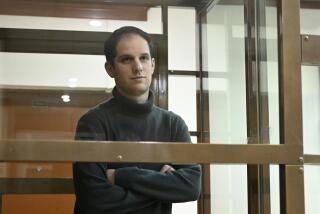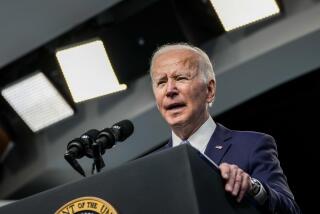Soviets Leave Door Open to ’86 Summit : But Gorbachev Says Global Atmosphere ‘Must Be Appropriate’
WASHINGTON — Soviet leader Mikhail S. Gorbachev on Sunday left the door open for a summit meeting with President Reagan this year, and the Administration reacted by saying it expects the meeting to take place despite the “political posturing” that has occurred since American planes bombed Libya last week.
Gorbachev told reporters in Potsdam, East Germany, that if the Reagan Administration “continues what it is doing today, attempting to poison the international atmosphere and worsen it, this will overshadow plans for a future meeting. For the meeting to take place, there must be an appropriate atmosphere in international relations.”
However, in informal comments translated by Russian-speaking reporters, Gorbachev said, “If the American Administration realizes that this (creating the right atmosphere) is the path to take, then we are ready for it (a summit).”
Ambiguous Statements
Gorbachev’s remarks regarding possible U.S. talks appeared to be purposely ambiguous, not closing the door to a meeting but laying a foundation for blaming the United States if a meeting should fall through. The Kremlin chief reminded reporters that, in a speech to an East German Communist Party meeting last week, he both criticized the attack on Libya and assailed the Reagan Administration for refusing to go along with his moratorium on underground nuclear tests.
“Let them take thought in Washington,” Gorbachev said on a visit to the town outside Berlin where Soviet, American and British leaders signed an agreement in August, 1945, that--among other things--sealed the division of Germany. “We are ready to make real steps toward peace.”
The Kremlin last week called off a summit-planning visit to Washington by Soviet Foreign Minister Eduard A. Shevardnadze after the raid on Libya. The two sides have yet to reach agreement on a date for a summit meeting.
White House Statement
The White House issued a statement Sunday saying that Reagan took “seriously” the commitment he and Gorbachev made last November in Geneva to meet again this year in Washington and next year in Moscow.
“For our part, we are willing to talk and negotiate with the Soviet Union because we want to solve the problems that divide our two countries, and we consider this much more important than political posturing,” the statement said, taking a swipe at Soviet maneuvering over the summit. “We want to work with all nations including the Soviet Union in resolving the threat of international terrorism.”
Underscoring that position, White House Chief of Staff Donald T. Regan, in an NBC television interview taped before Sunday’s developments, said that the Administration expects Gorbachev “to live up to his word” and meet with Reagan.
New Geography
“The summit has to go forward,” Regan said, adding: “The head of the second largest nation in the world gave his promise to the head of the largest nation in the world that he would come visit him and in return President Reagan would go to the Soviet Union in 1987. We expect that man to live up to his word and I think he will.”
In terms of area, the Soviet Union is the largest nation in the world while China is the most populous.
In a comment that could have a bearing on the summit maneuvering, Regan said in the NBC interview that he does not expect the President to reach a final decision on continued observance of the unratified second strategic arms limitation treaty until special advisers Paul H. Nitze and Edward L. Rowny return in about two weeks from consultations with U.S. allies.
While “a lot of people in Congress”--most of them Democrats-- are urging continued observance of “a treaty that’s never been confirmed by the Senate,” Regan said “it’s not a treaty that should be observed.”
Asked if he sympathizes with the view of the treaty’s critics, Regan replied that “it has a certain amount of logic in it, and I try to be a logical person.”
More to Read
Sign up for Essential California
The most important California stories and recommendations in your inbox every morning.
You may occasionally receive promotional content from the Los Angeles Times.










